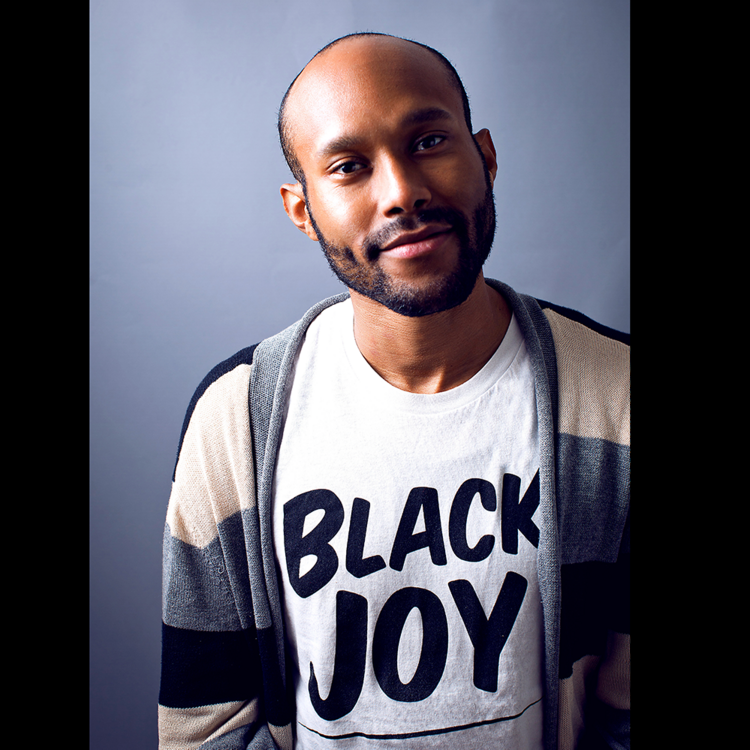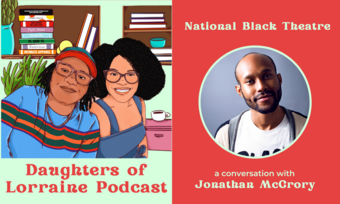Interview with Ron Simons
Independent producers Jiles King, Jonathan McCrory, and Anthony McDonald met with Broadway producer Ron Simons, to talk about black theatre on Broadway.
Anthony McDonald: What is your definition of black theatre?
Ron Simons: I no longer know what black theatre means to be honest with you. I used to be a company member up here at the Classical Theatre of Harlem. I remember that I was having a conversation and I was talking about, “Well, we as a black theatre institution we…” and I got stopped and it was said, “Oh no, we are not a black theatre.”
Jiles King: Who stopped you?
Ron Simons: Alfred Preisser or Chris McElroen. And I said “No? Why don’t you think we are a black theatre?” They said “Well, you know, we go beyond that…” And I didn’t quite understand why. At the end of the day I felt it was because the two of them were not African American, so therefore it’s not black theatre. Which I thought was, at the very least narrow minded, and contradicted my whole purpose. So, at that point, I started questioning what is black theatre? And I’ve yet to figure it out because Black theatre is changing. Black theatre to me used to be these institutions that were spread across the country that often had African American leadership, were doing plays that were either about or within the African American community, who were hiring African American actors. But now so many institutions have come under fiscally challenging situations, I find that some of these theatres are just hosting. Someone else develops the work and the theatre just brings it in for a few weeks or a month. So, I think that definition is evolving, but if I was put in a corner with a gun to my head, I would say that black theatre in my mind should be dedicated to creating works that reflect the values, the morals, the challenges, the myths, the beliefs of the African American community.
Jiles: Do you think that could be told or fully realized with white leadership?
Ron Simons: I think that black folks have a sensibility that no matter how intertwined another person might be in African American culture, they will not truly be as impactful as someone who is African American. With that being said, I think it’s perfectly fine and I would never tell someone that because you are not African American that you shouldn’t direct this play. But I will tell you that from my experience African American directors are able to get under and into a subject matter if it is about African American culture in ways that have eluded white directors that I have worked with. I think it’s important for us to tell our own stories, to write our own stories, to act in our own stories, to direct our own stories. I feel that is really important in maintaining our culture, in reinvesting in our culture, so that it is our culture, without a filter. Now I’m also a strong believer that if it’s good theatre it will have universal themes that will resonate with everyone, whether you are African American, Asian American, Latino American, or whatever. I think good work and good storytelling is just good storytelling. So I feel that it is important for us as a community to continue to write, produce, direct, act in, and financially support black theatre.
I think it’s important for us to tell our own stories, to write our own stories, to act in our own stories, to direct our own stories. I feel that is really important in maintaining our culture, in reinvesting in our culture, so that it is our culture, without a filter.
Anthony McDonald: What place do you hold within the black theatre?
Ron Simons: I think that my place as a producer in the arts is that of a young voice. I come from a business background. I have a MBA in marketing and international business, so it’s hard for me, unless I am just completely orgasmic about some piece, to not look at the monetary side because it takes money to do anything. I don’t care if you are doing it in the smallest, most remote regional theatre. Somebody has to pay the light bill. I think I am a newer voice on the scene that is unique because I had an entire career in business before I came to the arts. So I think I have a unique perspective. I’m not saying it’s necessarily right. I’m not saying that I’m going to be the best storyteller. From a producing point of view, I think I have a unique perspective because of who I am and my background and my experience before I became a producer.
Jonathan McCrory: What made you want to become a producer?
Ron Simons: I came to New York as an actor and I started doing some interesting work and some not particularly interesting work, but I got to meet some amazingly talented writers, playwrights, screenwriters, and some amazing actors. Occasionally, I would see some work that was worthy of their talent, but there was a lot of work out there that I thought was either mediocre because it didn’t speak to me or it didn’t try to change a way of thinking. I met these really talented people and I said that they should be doing better work. If someone isn’t going to be bringing better work to the table then maybe I should be doing it. And why not? You’ve got to start somewhere. I hadn’t planned on it but you just reach a stage where you say something has to be done. How can I do it? I had a background in business. I felt that I’m a good storyteller. I can recognize a good story when I see it, so I’ll do it. And maybe I’ll fail or maybe I’ll succeed, but I will certainly know that I have tried.
Anthony: Do you think there are barriers that are stopping African Americans from becoming theatrical producers at the Broadway level?
Ron Simons: At the Broadway level I think there are a number of challenges. Not the least of which is money, because if you can‘t bring in a lot of money to the table in the role of investors, then you have to bring your own money to the table. Typically those of us who have those resources, in my experience, are not looking to invest in theatre. They are looking for return. Not that we don’t support theatre. I know a number of people here in New York, who are very well to do who are on the board of directors of various arts organizations in the city. There were other producers of color on Streetcar Named Desire. I expected to have a strong representation of African Americans that would back Porgy and Bess, but I was disabused of that idea the first time I walked into the room. I think that the number one issue is financing, and I think our job is to introduce those that do have the money into the producing role on Broadway because, it goes back to what I said before, that it’s important for us to tell our stories. Whether that means we are at the box office, or we’re hiring the staff and the crew, or we’re on stage. The only way that’s going to happen, on a Broadway level, is if we invest in Broadway shows.
Jiles King: What kind of works are you attracted to and do you like to put on stage?
Ron Simons: Well, first of all, it has to be good storytelling. It has to be a story that is accessible. It has to be a story where there is an arc to not only the characters, but the piece itself. After that I’m looking for stories that have not been told yet. The fact is that so many themes have been repeated in so many plays, it’s hard to come up with a brand new construct at the basic level. It’s the story of redemption. It’s a coming of age story. You know what I mean? When you try to boil it down to its simplest form there are not an infinite number of themes, but there are an infinite number of stories that can reflect or comment on those themes. That’s what I look for. If it’s a situation, a character I’ve never heard of or seen before, a community that I’ve not been exposed to, then it has to be a situation with a universal theme that we’ve seen before. Boy meets girl, boy loses girl, boy gets girl back, but it’s set in the Midwest with some Japanese cowboys.
Anthony McDonald: How do you see Broadway producers like yourself working with black theatre institutions to help propel the voices of that community to foster new artistic voices?
Ron Simons: Well, first of all we have to invest. I am a supporter of work from everything from web series like The Abandon by Keith Josef Adkins to the most current production that the Hansberry Project is doing in Seattle by Valerie Curtis-Newton. I think it’s very important that we invest in black theatre before it becomes a Broadway-ready or a Broadway-bound production. One of the things that I really need to do is go to the conference that happens every two years, the National Black Theater Festival. As Broadway producers, it’s just so much work to get the work done that we don’t spend enough time finding the funding sources to build a community that enables people to become part of the funding source of black theatre in this country. And it’s really, really important. And it’s also the fact that one of the issues that black theatre suffered from in the past is that we can put on a good show, we can direct, we can act our behinds off; culturally we understand the model, we understand the art but we aren’t always as knowledgeable in the management of the money to keep the theatre open so that we can do the work that we’re supposed to do. I think we really still struggle with the fiscal competence to allow us, long-term, to continue to do the work that we want to do.
Jiles King: Do you think that’s why black theatres don’t receive enhancement deals? For instance, Porgy and Bess went to A.R.T. Why didn’t it go to the Hansberry Project?
Ron Simons: I don’t think that is common knowledge at the generic Broadway level for producers. I can be wrong, but I think that when you pick a choice, for example, like Porgy and Bess, it is a bit of a unique construct because it is a classic in the American theatre and certainly in the opera world. The problem lies in the development, and I don’t mean fiscal development, but development in terms of the product, the play, and the story. But someone has to sit down and say we feel that this is going to be marketable. It’s not a guarantee by any means, but if the producing partners don’t believe that they will be able to turn a profit, if it’s not, “commercial,” then it will not even be considered. And there is work that is being done in regional theatres, which I think is very important work, but does not fit the definition of the average Broadway construct of commercial. I think for example of Ruined that was off-Broadway a few years ago, Pulitzer Prize winner, an amazing show, incredible acting, very well directed, incredibly well written, but why didn’t that come to Broadway? I think it didn’t come to Broadway because people didn’t think it was commercial.
Jiles King: Do you feel culturally responsible as lead producer to represent your culture or can it be any story that moves you?
Ron Simons: That’s a good question and I have to tell you that I can’t say that it will have to be an African American story, because honestly if I found a story tomorrow that I thought was off the chain and I thought was highly commercial and an amazing story and deals with a Latino mother who lives in Albuquerque, I would put myself behind that project to make that happen. Am I drawn to mostly properties that deal with people of color in general? Yes.
Jonathan McCrory: Thinking about Broadway, in the future, how do you see new voices, like Katori Hall and new productions like Fela!, works written by African Americans getting into the pipeline?
Ron Simons: It has to start, and I know I’m beating a dead horse, but it has to start with the story. You just need to have one or two important people in the community, be it the right theatre or the right funding source that says that this person is a genius. There are usually, arguably, three to five storytellers who are the star children of that period–over a period of time, that might be a year or five years. And their work gets done. It gets workshopped and gets put on its feet, because that person has become a brand. The pedigree of the product is important. I can’t stress enough how I try to tell that to other artists of color, black folks, that you can write the best thing since sliced bread, this play could be amazing but until anyone knows about it, it’s just a little artistic masturbation because you have not closed the loop. You have to have some heat behind it. What I’ve seen is that a lot of African American artists focus solely on the work, which has to be done to begin with. But after that, then you’ve got to recognize that there is the business side of making art. It goes beyond just your talent.
Jonathan McCrory: You named a lot of institutions and I agree that you have to get in there if you want to be vetted, but what I’m struggling with is where are the black institutions that can vet me and give me those opportunities?
Ron Simons: I’m trying to make that happen. I’m trying to build a brand with SimonSays. I want people to say, “SimonSays, what does that mean to me?” That means that this is probably a socially conscious product, it’s definitely a very good story; it’s very well executed and there are going to be some universal themes in there. From the 1,500 submissions I get through my website, there are a lot of really good plays. And I want a story, that when I call someone like [Broadway producer] Jeff Richards and say, “Jeff, you need to come and see this play.” That he won’t go Ron who?” They’ll go “Oh Ron, do you really think I should?” And they’ll see it, or read it.



















Comments
The article is just the start of the conversation—we want to know what you think about this subject, too! HowlRound is a space for knowledge-sharing, and we welcome spirited, thoughtful, and on-topic dialogue. Find our full comments policy here
Two questions and a thought:
1. Mentorship was not discussed, do you have young producers on your team that work or shadow with you? This is KEY to us and our art.
2. How are you innovating the concept of what commercialism means in relation to the blk story?
Jonathan-- you are a blk institution! When peeps create, they create from need. You have many examples of great blk artiss doing work if they directly advocate for you or not. Remember, it may not come exactly how you want it, but it will come when most necessary and will be perfect... I speak for you very much but don't tell you when I do each time. We all must trust!!!